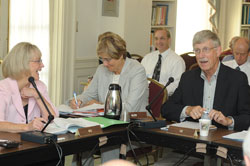Trans-NIH effort launched on global health
September - October, 2009 | Volume 8, Issue 5

NIH Director Dr. Francis S. Collins urged
members of the new trans-NIH working group
on global health research to find better ways
to leverage resources and coordinate
international activities to improve human
health.
NIH should capitalize on the current supportive environment for global health science, its director Dr. Francis S. Collins recently urged members of the newly created Trans-NIH Global Health Research Working Group.
"Our country is poised to move from the hard power stance to soft power or, as Hillary Clinton said, smart power. Shouldn't we at NIH be leading that charge?" he asked.
The high-level working group is the result of a two-year effort by institute and center directors to analyze global health research activities at NIH and explore better ways to coordinate efforts, both across NIH and throughout the government. The Obama administration has pledged $63 billion to its Global Health Initiative and is seeking input on its approach.
"If we don't step forward and point out the value of research, the focus is likely to be increasingly on delivery, which of course is critical," Collins noted. "But we need the research aspect of this to be vigorously supported."
The genesis of the working group was the previous director's leadership forum in 2007, during which a white paper was commissioned to detail the agency's role in global health. Its recommendations guided a day-long discussion by NIH global health leaders last May.
Fogarty director Dr. Roger I. Glass, who also serves as the NIH associate director for international research, reported to IC directors in June and received their support to form the standing working group on global health research.
High-level representatives of 18 ICs and the Office of the Director participated in the group's inaugural session, co-chaired by Glass.
Participants agreed to focus on three overarching issues - improving data collection on NIH international activities, ensuring clinical trials supported by NIH meet the highest possible standards no matter where they take place and developing strategies to position the NIH to play a strategic role in the U.S. government's global health activities.
"When I came here to Fogarty, we had no data on NIH's commitments and investments in global health nor on the different areas of the world where people are invested and what they are doing," Glass recounted.
There is still no comprehensive system to track the foreign investments made by NIH, acknowledged Dr. Sally Rockey, acting director of the Office of Extramural Research. Foreign sites that receive direct awards from the NIH are captured in the system but foreign components of domestic awards are not, she said. "We want to strengthen our database so we can understand the funding gaps."
Rockey suggested a possible solution may involve creating a new field that grantees would be required to use to report on foreign segments of domestic grants.
She agreed to co-chair a subcommittee on data collection issues with Dr. Jim Herrington, Fogarty's international relations director.
A trans-NIH framework to assist the planning and implementation of international research projects was suggested by Dr. Susan Shurin, acting director of the National Institute of Child Health and Human Development.
It could collect best clinical research practices and other guidance by country or region, including advice on developing partnerships with NGOs and other governments. Other issues such as regulatory requirements, tissue specimen movement and human subjects' protection could also be provided, she said.
Such shared information could reduce the time for contract negotiations on foreign projects, encourage IRB reciprocity and help recruit clinical trial participants, noted NCRR director Dr. Barbara M. Alving. A virtual "concierge of experts" could also be assembled to provide useful on-the-ground experience to other investigators.
A second subcommittee, led by Shurin and Dr. Hugh Auchincloss, deputy director of the National Institute of Allergy and Infectious Diseases, will develop the clinical trials resource.
It was also decided the group will convene country-specific meetings to facilitate inter-IC collaboration and share best practices for engaging a specific country.
The full working group is scheduled to meet again in December.
More Information
To view Adobe PDF files,
download current, free accessible plug-ins from Adobe's website.